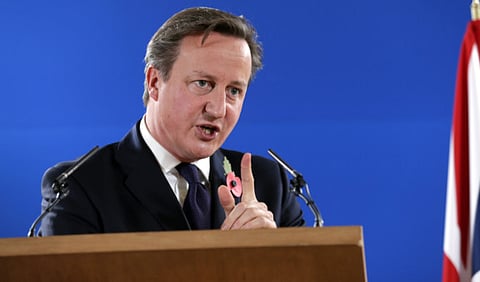Cameron is right to stand up to Brussels
It is easy to separate an ideological EU-hatred from a legitimate grievance

There is a way of explaining British Prime Minister David Cameron’s showdown with the European Commission that flatters the latter. The commission is rational to a fault. It follows the internal logic of rules to their ultimate end. If that means a 2.1 billion euro (Dh9.8 billion) surcharge on Britain for the European Union (EU) budget, it will not allow a little thing like common sense to get in the way.
Cameron, the most English of prime ministers, disdains this continental literalism. He lives in the half-world of compromise, where rules can be finessed and subjected to a smell test by reasonable chaps.
These contrasting habits of mind spring from distinct cultures, but the commission’s way is better at keeping order in a 28-nation union. Britain’s favourite thing about the EU, the internal market, depends on the commission harmonising regulations and smashing open national protectorates with an even hand.
This is the flattering account and it will not do. In truth, the enforcement of EU rules is a messy and partial business. The letter of the law has always vied with politics. If a big member state makes a fuss, pointing to overwhelming public opinion at home or exceptional strategic interests, it can have its way. This is how the stability and growth pact was ignored by several member states in the past decade. It also explains why the internal market remains patchy.
When Francois Hollande, the President of France, called on Cameron to “stick to the rules” last week, the prime minister’s team almost died of laughter. They have seen French governments show less than perfect fidelity to EU rules. Even now, the commission is privately informing France and Italy it is open to compromise in the enforcement of national budget restrictions.
So Brussels is not a fortress of pure logic. It makes allowances for political realities in member states. The political reality in Britain is that Cameron cannot pay this surcharge, certainly not by the due date of December and probably not by the general election in May, if ever. It would risk political death. From the anti-EU UK Independence Party (Ukip), his own Conservatives and much of the electorate would come a torrent of anger that he might not withstand.
There is already a chance of some kind of backbench movement against Cameron in the event of next month’s by-election in Rochester, in southern England, being lost to Ukip. Unsettling the only mainstream leader who is not a drag on his party’s popularity six months before an election may seem like manic self-mutilation, but this is the Tory party. “Nervous people do silly things,” says one insider. Angry people do even sillier things. The prompt payment of the EU bill would incite Cameron’s enemies.
It could also provide a once-in-a-generation spur to British euroscepticism, hardening committed foes of the EU and pulling undecided voters into their column. The reason for the surcharge lies in the fug of econometric methodology. But it will take no effort at all for Ukip to spin it as a tax on prosperity — and a punishment for staying out of a ruinous single currency dreamt up by zealots. Britons will not see an even hand.
Cameron has rarely seemed in control of his own Europe policy. His government lives hand to mouth, periodically scavenging for a sop to backbenchers to keep them at a safe distance. But he is authentically livid about this surcharge, and with reason.
It is easy to distinguish between ideological EU-hatred and a legitimate grievance. Just do this thought experiment: Imagine the prime minister were a Labour pro-European such as the opposition leader Ed Miliband. Under a Miliband premiership, the controversy over whether Britain should opt in to the European arrest warrant would be no such thing. He would proceed easily enough; the resistance would come from the right and never attain critical mass.
The surcharge is another matter. If a Labour prime minister were sent an invoice for 2.1 billion euro, due almost immediately and at a time of fiscal penury for his own country, he could not just dutifully pay. He would play for time and seek a discount. Voters and a meaningful number of his own MPs would insist on this much, whatever his own views. So this is not a dispute that Cameron has concocted out of nothing. It would trouble anyone doing his job.
Immanuel Kant, the German philosopher whose notions of perpetual peace supposedly inform the EU, had said: “Out of the crooked timber of humanity, no straight thing was ever made.” Even the great Enlightenment man saw the need for worldly compromises. The EU should strike one with Cameron.
— Financial Times
Sign up for the Daily Briefing
Get the latest news and updates straight to your inbox



